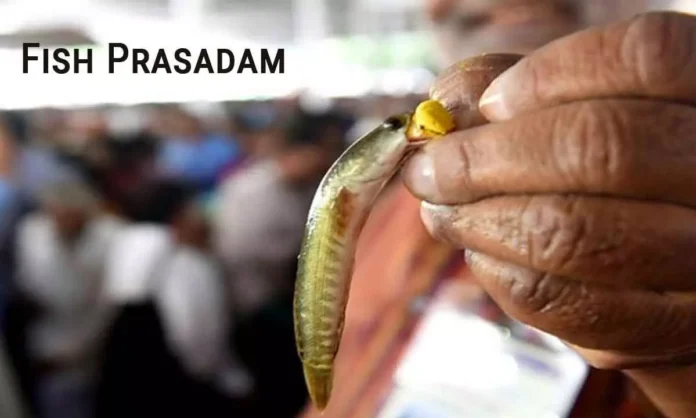Hyderabad’s renowned “fish prasadam” event, an age-old tradition believed to offer relief from asthma and respiratory issues, is scheduled to resume this year on June 8th. Spearheaded by the Goud family, led by the late Bathini Harinath Goud, the event has been a fixture for the past 178 years, drawing thousands of participants annually.
The unique practice involves swallowing a live murrel fish, or “Bathini fish,” stuffed with a special herbal paste. Devotees flock to the event in hopes of finding relief from their respiratory ailments, despite skepticism from the medical community.
Dr. Shivakumar K, MD in Respiratory Medicine and senior consultant Pulmonology at Birds Clinic in Bengaluru, stresses the importance of evidence-based treatment options for asthma. While acknowledging the cultural significance of traditional remedies like the fish prasadam, Dr. Shivakumar emphasizes the need for scientific research to validate their efficacy and safety.
The fish prasadam event has garnered attention and controversy over the years, with supporters touting its purported benefits and critics raising concerns about its unorthodox nature and lack of scientific evidence. However, for many participants, the event holds cultural and spiritual significance, rooted in centuries-old traditions passed down through generations.
Despite advancements in modern medicine, traditional practices like the fish prasadam continue to hold sway in certain communities, highlighting the intersection of cultural beliefs and healthcare practices. While some may view it as a quaint tradition, others see it as a potent symbol of faith and hope for relief from chronic health conditions.
As the date of the fish prasadam event approaches, anticipation and debate surrounding its efficacy are sure to intensify. For participants, it offers a glimmer of hope in their ongoing battle against respiratory ailments, while for skeptics, it remains a curious relic of the past awaiting scientific scrutiny.
As preparations for the fish prasadam event ramp up, organizers are expecting a significant turnout, as in previous years. Volunteers are working tirelessly to ensure the smooth operation of the event, which involves catching, preparing, and distributing thousands of live fish to participants.
For many attendees, the fish prasadam event is more than just a medical treatment—it’s a deeply ingrained cultural tradition that holds deep significance in their lives. Families often travel from far and wide to participate in the event, viewing it as a sacred ritual that has been passed down through generations.
However, the resurgence of the fish prasadam event also reignites debates about the intersection of traditional medicine and modern science. While proponents argue for the therapeutic benefits of the treatment, skeptics remain wary of its unproven efficacy and potential health risks.
Dr. Shivakumar K underscores the importance of approaching traditional remedies with caution and skepticism, especially when it comes to serious medical conditions like asthma. While cultural practices may offer comfort and hope to some, Dr. Shivakumar emphasizes the need for rigorous scientific research to validate their effectiveness and ensure patient safety.
In recent years, there has been growing interest in studying traditional remedies like the fish prasadam using scientific methods. Researchers are exploring the potential therapeutic compounds present in the herbal paste used in the treatment and investigating their effects on respiratory health.
At the same time, efforts are underway to raise awareness about evidence-based treatments for asthma and other respiratory conditions. Health authorities and medical professionals are working to educate the public about the importance of seeking medical advice from qualified professionals and relying on scientifically proven treatments.
As the fish prasadam event approaches, the debate over its efficacy and safety is likely to continue. While some will eagerly participate in the tradition, others will remain cautious, preferring to rely on established medical practices. Ultimately, the fish prasadam event serves as a reminder of the complex interplay between tradition, culture, and healthcare in society.

